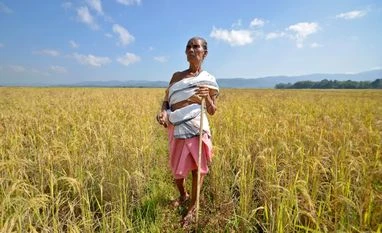Crop insurance has become a vital component of agricultural support systems in India, providing a safety net for farmers against crop damage and financial losses. These schemes aim to mitigate the risks faced by farmers due to various factors such as extreme weather conditions, natural disasters, and market fluctuations.
Crop insurance is categorised into three types:
Multiple peril crop insurance (MPCI): Offers financial protection against losses due to weather-related events like floods and droughts.
Actual production history (APH): Provides coverage for losses resulting from wind, hail, insects, and other perils. It also covers situations where the actual yield is lower than the estimated yield, compensating for the difference.
Crop revenue coverage (CRC): Protects against yield losses and covers the revenue generated from the yield. If crop prices drop, this insurance compensates for the revenue shortfall.
Eligibility to take crop insurance
All farmers are eligible to take the crop insurance schemes in India, including sharecroppers and tenant farmers. However, they need to grow the notified crops in the notified area provided under the schemes or by the company.
Benefits of crop insurance schemes
Financial support in case of crop failure: Crop insurance provides financial compensation to farmers when they suffer losses due to crop failure caused by natural calamities, pests, or diseases. This support helps them recover and continue farming without severe financial distress.
Encouragement to adopt advanced farming practices: With the assurance of financial protection, farmers are more likely to invest in modern technologies and progressive farming practices. This can lead to higher crop yields, better quality produce, and increased overall agricultural productivity.
Maintenance of agricultural credit flow: Crop insurance ensures that farmers can maintain their creditworthiness. Financial institutions are more willing to lend to farmers who have crop insurance, knowing that the risk of default due to crop failure is mitigated.
Streamlined loss assessment and statistical accuracy: The process of loss assessment under crop insurance schemes helps in building a precise and comprehensive statistical database for crop production. This data can be used for better planning and management of agricultural activities.
Tax exemption on premiums: Farmers benefit from tax exemptions on the premiums paid for crop insurance policies. This reduces the overall cost burden on farmers and makes crop insurance more affordable.
Access to low-interest crop loans: Farmers with crop insurance are often eligible for crop loans at lower interest rates. The reduced risk for lenders results in more favourable loan terms for insured farmers, aiding them in managing their finances more effectively.
List of companies which provide Crop Insurance:
Following are the list of General Insurance Companies which offer Crop Insurance Schemes:
Reliance General Insurance Co. Ltd.
Cholamandalam MS General Insurance Co. Ltd.
Agriculture Insurance Company of India Ltd
IFFCO-Tokio General Insurance Co. Ltd
HDFC ERGO General Insurance Co. Ltd.
ICICI Lombard General Insurance Co. Ltd
Future Generali India Insurance Company Limited
Bajaj Allianz General Insurance Co. Ltd
Universal Sompo General Insurance Company Limited
SBI
However, the biggest crop insurer is PMFBY -- Pradhan Mantri Fasal Bima Yojana.
The objective of the scheme is to provide financial support to farmers suffering crop loss/damage arising out of unforeseen events as well as stabilising the income of farmers to ensure their continuance in farming.
Talking to Business Standard, Shilpa Arora, Co-founder- Insurance Samadhan said, “The private insurers are helping the government as well as farmers in successfully implementing the policy by latest advancement in technology like GIS as well as increase in voluntary participation of non-loanee farmer by extensive campaigning in rural areas. The government has reached a certain level in terms of success but there is a lot of scope where private insurers & govt can sync up to provide more progressive insurance solutions to farmers.”
)

)